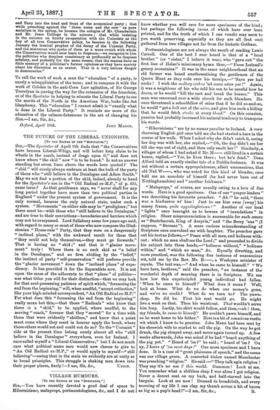- VILLAGE HUMOURS.
[To TEL Emma Ow THY "Bracravos.."] fha,—Yon have recently devoted a good deal of space to lifibernicisms, malaprops, portmantologisms, &c., and. I do not
know whether you will care for more specimens of the kind ; but perhaps the following (none of which have ever been printed, and for the truth of which I can vouch) may seem to you worth preserving, especially as they are all (but one) gathered from two villages not far from the historic Gotham.
Portmantologisms are not always the result of reading Lewis Carroll. One of the best I ever heard is that of a "local brother" (or "sister," I believe it was), who "gave out" the first line of Robot's missionary hymn thus,—" From Iceland's greasy mountains." It was in the same neighbourhood that an old farmer was heard anathematising the gentlemen of the Quern Hunt as they rode over his turnips,—" 'Sara yer bad necks ! I wish the mollery corbus 'ud come arter yer !" Again, it was a neighbour of his who told his son to be careful how he drove, or he would "kill the cart and break the horses." This man was renowned over a wide circuit for such blunders. He once threatened a schoolfellow of mine that if he did so-and-so, he would "get a bolt out of the osier, and give him such a hiding that he would fetch stroke at every blood." On this occasion, passion had probably increased his natural tendency to transpose his words.
" Hibernicisms " are by no means peculiar to Ireland. A very charming English girl once told. me she had started a hare in the course of her walk. When I asked why she didn't catch it, seeing her dog was with her, she replied,—" Oh, the dog didn't see her till she was out of sight, and then only smelt her !" Similarly, a villager of whom I had asked if Mr. hi— still lived in a certain house, replied,—" Yee, he lives there ; but he's dead." Dean Alford told an exactly similar tale of a Dublin footman. It was not without a certain appropriateness, albeit unconscious, that old Ned W—, who was noted for this kind of blunder, once told me an anecdote of himself (he had never been out of Nottinghamshire) and "another Irishman."
"Malaprops," of course, are usually owing to a love of fine words. Here is a good specimen. One of our" prayer-leaders"
was describing his favourite preacher. " !" he said, "there woz a hinfluence wi' him ! Just to see him swee [-sway] his massy frame, quite ayquilaybritinn ! " Another of our local " lights " once besought us to beware of "inundations" in religion. Sheer mispronunciation is answerable for such errors as " Snatchacrab, King of Assyria," and "the Beery 'ans " (I suppose, "Bereans "). A more curious misunderstanding of Scripture once convulsed me with laughter. The preacher gave oat his text as follows,—" Peace with all men, and holiness with- out : which no man shall see the Lord ;" and proceeded to divide his subject into three heads,—" holiness without," "holiness within," and "which no man," Ste. Equally diverting, and more practical, was the following fine instance of unconscious wit, told me by the Bev. Mr. B—, a Wesleyan minister of repute. The text was,—" And when he came to himself." "We have here, brethren," said the preacher, "an instance of the wonderful depth of meaning there is in Scripture. We see how low this unprincipled young individual had fallen. 'When he came to himself !' What does it mean ? Well, look at home. What do we do when our money's gone, and. we've no credit? What do we turn to P The pawn- shop. So did he. First his coat would go. He might live a week on that. Then his waistcoat. That wouldn't serve him long. Lastly, his shirt would follow, and then,—ah I then, my friends, he came to himself! He couldn't pawn himself, and so he went home to his father." Here is a bit of conscious rustic wit which I know to be genuine. John Mann had been sent by his shrewish wife to market to sell the pig. On the way be got drunk, the pig strayed away, and never again turned up. A few weeks afterwards, John was asked if he had "heard anything of the pig yet." "Heard of 'Ma ?" he said ; "heard of 'ins? On ay, I hears of 'im most dap I" One more specimen and I have done. It is a case of "great plainness of speech," and the scene was our village green. A converted tinker named Manchester was preaching" religion." He said :—" They talk agin religion ! They say it's no use i' this world. Gammon ! Look at me. You remember what a shiftless chap I wor afore I got religion. Never a decent coat on my back, and half-starved into the bargain. Look at me now ! Dressed in broadcloth, and every morning of my life I can clap my thumb across a bit of bacon
as big as a pup's head l"—I am, Sir, &c., B.


































 Previous page
Previous page